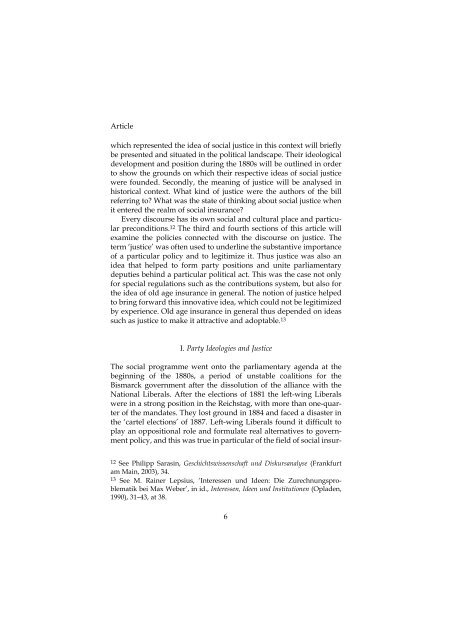Download - German Historical Institute London
Download - German Historical Institute London
Download - German Historical Institute London
You also want an ePaper? Increase the reach of your titles
YUMPU automatically turns print PDFs into web optimized ePapers that Google loves.
Article<br />
which represented the idea of social justice in this context will briefly<br />
be presented and situated in the political landscape. Their ideological<br />
development and position during the 1880s will be outlined in order<br />
to show the grounds on which their respective ideas of social justice<br />
were founded. Secondly, the meaning of justice will be analysed in<br />
historical context. What kind of justice were the authors of the bill<br />
referring to? What was the state of thinking about social justice when<br />
it entered the realm of social insurance?<br />
Every discourse has its own social and cultural place and particular<br />
preconditions. 12 The third and fourth sections of this article will<br />
examine the policies connected with the discourse on justice. The<br />
term ‘justice’ was often used to underline the substantive importance<br />
of a particular policy and to legitimize it. Thus justice was also an<br />
idea that helped to form party positions and unite parliamentary<br />
deputies behind a particular political act. This was the case not only<br />
for special regulations such as the contributions system, but also for<br />
the idea of old age insurance in general. The notion of justice helped<br />
to bring forward this innovative idea, which could not be legitimized<br />
by experience. Old age insurance in general thus depended on ideas<br />
such as justice to make it attractive and adoptable. 13<br />
I. Party Ideologies and Justice<br />
The social programme went onto the parliamentary agenda at the<br />
beginning of the 1880s, a period of unstable coalitions for the<br />
Bismarck government after the dissolution of the alliance with the<br />
National Liberals. After the elections of 1881 the left-wing Liberals<br />
were in a strong position in the Reichstag, with more than one-quarter<br />
of the mandates. They lost ground in 1884 and faced a disaster in<br />
the ‘cartel elections’ of 1887. Left-wing Liberals found it difficult to<br />
play an oppositional role and formulate real alternatives to government<br />
policy, and this was true in particular of the field of social insur-<br />
12 See Philipp Sarasin, Geschichtswissenschaft und Diskursanalyse (Frankfurt<br />
am Main, 2003), 34.<br />
13 See M. Rainer Lepsius, ‘Interessen und Ideen: Die Zurechnungs pro -<br />
blematik bei Max Weber’, in id., Interessen, Ideen und Institutionen (Opladen,<br />
1990), 31–43, at 38.<br />
6













